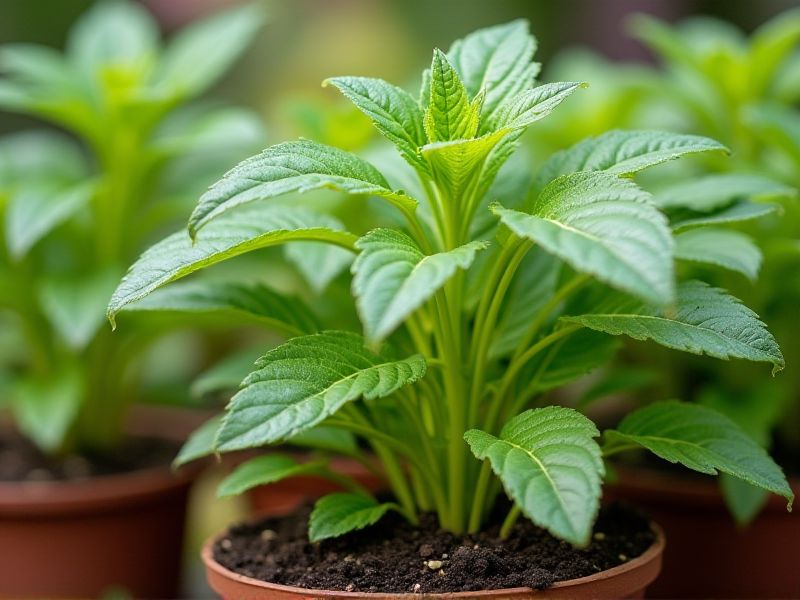
Growing vegetable plants in pots is an excellent way to maximize space and ensure a bountiful harvest. Popular choices for container gardening include tomatoes, peppers, lettuce, and herbs like basil and parsley, as they thrive in limited soil. It is essential to choose the right pot with adequate drainage holes and a suitable size to accommodate root growth. Regular watering and the use of nutrient-rich potting soil will significantly enhance plant health and yield. By providing proper sunlight and protection from pests, you can enjoy a flourishing vegetable garden right on your balcony or patio.
List of some Vegetable plants that grow in pots
- Tomato (Solanum lycopersicum)
- Basil (Ocimum basilicum)
- Lettuce (Lactuca sativa)
- Spinach (Spinacia oleracea)
- Radish (Raphanus sativus)
- Cilantro (Coriandrum sativum)
- Pepper (Capsicum annuum)
- Chard (Beta vulgaris subsp. vulgaris)
- Eggplant (Solanum melongena)
- Arugula (Eruca vesicaria)
Important things about Vegetable plants that grow in pots
Pot Size Matters
Choosing the right pot size is crucial for the health and growth of your vegetable plants. Smaller pots can restrict root development, leading to stunted growth and poor yields, while larger pots provide ample space for roots to spread and access nutrients. For optimal results, select pots that are at least 5-10 gallons for larger vegetables like tomatoes and peppers, and 1-3 gallons for herbs and smaller crops. Ensure your pots also have adequate drainage holes to prevent waterlogging, which can harm your plants' roots.
Soil Quality Is Crucial
Soil quality significantly impacts the health and yield of vegetable plants grown in pots. Nutrient-rich, well-draining potting soil enhances root development and increases moisture retention, which is vital for optimal growth. Incorporating organic matter, such as compost or worm castings, enriches the soil with essential nutrients while promoting beneficial microorganisms. Regular soil testing allows you to monitor pH levels and nutrient content, ensuring your potted vegetables thrive throughout their growing season.
Drainage Is Essential
Proper drainage is crucial for the health of vegetable plants grown in pots, as it prevents root rot and ensures adequate oxygen flow to the roots. The use of pots with drainage holes allows excess water to escape, reducing the risk of waterlogged soil and promoting robust root development. Incorporating materials like perlite or gravel at the bottom of your pots can further enhance drainage while supporting soil aeration. Be mindful of the specific water requirements of each vegetable to create an optimal growing environment tailored to your plants' needs.
Sunlight Requirements Vary
When growing vegetable plants in pots, sunlight requirements play a crucial role in their health and productivity. Most vegetables thrive in full sun, requiring at least 6 to 8 hours of direct sunlight each day to maximize growth and fruiting potential. Consider growing sun-loving varieties like tomatoes, peppers, and zucchini, which not only benefit from ample light but also adapt well to container gardening. For shadier spaces, opt for leafy greens such as spinach and lettuce, which can flourish with as little as 4 to 6 hours of sunlight.
Watering Needs Differ
Vegetable plants that grow in pots require a consistent watering schedule due to their limited soil volume, which can dry out quickly. It's essential to monitor the moisture level in the container's soil, as variations in temperature and sunlight can impact how fast it dries. Your vegetable plants, such as tomatoes and peppers, may need more frequent watering during hot weather or if placed in direct sunlight. For optimal growth, consider using self-watering pots or adding mulch to help retain moisture and reduce the frequency of watering.
Fertilization Is Important
Fertilization plays a crucial role in the growth and health of vegetable plants cultivated in pots. When using containers, it's essential to select nutrient-rich potting soil and apply a balanced fertilizer to ensure plants receive adequate macronutrients like nitrogen, phosphorus, and potassium. Regularly monitoring your plants for signs of nutrient deficiency, such as yellowing leaves or stunted growth, can guide necessary adjustments in your fertilization regimen. Organic options, like compost or worm castings, are excellent for enhancing soil quality while promoting sustainable gardening practices.
Companion Planting Benefits
Companion planting offers significant benefits for your potted vegetable plants, enhancing growth and pest resistance. For example, planting basil alongside tomatoes can improve flavor while deterring harmful insects. Similarly, marigolds can protect your peppers by repelling nematodes and other garden pests. By understanding the unique relationships between various plants, you can create a thriving and diverse container garden that maximizes yield and health.
Pest Management Strategies
Effective pest management strategies for vegetable plants grown in pots involve identifying common pests such as aphids, spider mites, and whiteflies. You can use organic solutions like neem oil or insecticidal soap to safely eliminate these pests without harming your plants or the environment. Regularly inspecting your plants for signs of infestations and maintaining proper watering and airflow can significantly reduce pest occurrences. Additionally, introducing beneficial insects like ladybugs and lacewings can provide a natural form of pest control, promoting a healthier growing environment for your container garden.
Regular Harvesting Promotes Growth
Regular harvesting of vegetable plants grown in pots enhances overall growth and productivity. By consistently removing mature fruits or leaves, you stimulate the plant's energy toward producing new growth rather than maturing existing produce. This practice also encourages better air circulation and sunlight exposure, leading to healthier plants and potentially higher yields. Furthermore, timely harvesting can prevent overripening and disease, providing you with fresher vegetables and an extended harvest season.
Seasonal Adaptation Is Necessary
Seasonal adaptation is crucial for vegetable plants grown in pots, as these plants require specific care to thrive in varying climatic conditions. Understanding the seasonal needs, such as temperature, light exposure, and water requirements, allows you to optimize growth and yield. This includes adjusting your watering routine during hot summer months or providing adequate insulation during colder winters. By recognizing the signs of seasonal changes, you can ensure your potted vegetables remain healthy and productive throughout the year.
